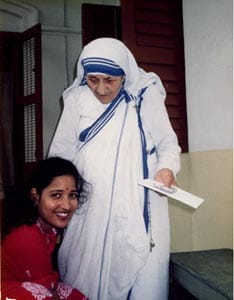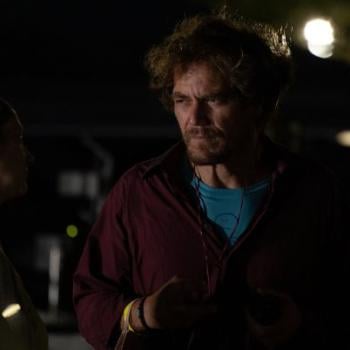 As a little girl, Ruma Bose fell in love with Mother Teresa through the colorful stories her mother told her every night about the "Super Angel." Years later, when she learned that the Saint had survived a heart attack, a 20-year-old Bose packed a bag, flew to Calcutta and showed up on the Mother Teresa's doorstep, determined to meet one of her heroes.
As a little girl, Ruma Bose fell in love with Mother Teresa through the colorful stories her mother told her every night about the "Super Angel." Years later, when she learned that the Saint had survived a heart attack, a 20-year-old Bose packed a bag, flew to Calcutta and showed up on the Mother Teresa's doorstep, determined to meet one of her heroes.
Now, nearly twenty years later, Bose, a successful entrepreneur and businesswoman, is drawing on her experience with Mother Teresa and the Missionaries of Charity for a new book on leadership principles called Mother Teresa, CEO: Unexpected Principles for Practical Leadership. (Visit the Patheos Book Club for more on this book.)
Bose spoke with Patheos' Deborah Arca about the inspiration for her book and how she strives to live out the "Teresa Principles" in her own life every day.
The title of your book, Mother Teresa, CEO, has got to have more than a few people raising their eyebrows.
It really all depends on how you define CEO. What I'm talking about in the book are the leadership principles that are used to execute on a plan and reach a stated goal. For me, there is no question that Mother Teresa was the Chief Executive Officer of the Missionaries of Charities.
I wrote this book to share the principles that made Mother Teresa so successful in her mission, not only to help business leaders, but also to help readers understand that they are also the CEOs of their own lives.
In fact, in the last chapter, you ask the reader: "What are you the Mother Teresa of?" You seem to be making the point that you don't have to be a saint to be an effective leader.
You don't have to be a saint to be a great leader, but I believe you do have to be a great leader to be a saint.
I think that when people read the book there are three key takeaways. First, you don't have to be a saint to begin to make these principles a part of who you are and how you interact with others. Next, look for the simple solution. As Mother Teresa taught us, there is amazing power in simplicity. Finally, act with grace and humility. These three messages are core to what I believe Mother Teresa's leadership teaches us.
You also speak to Mother Teresa's leading by example as a key aspect of her leadership style.
If there was rubbish on the floor, she wouldn't ask someone to pick it up. She would pick it up herself. She woke up at 4 am every morning and took a time of silence. She was compassionate and loving to everyone around her. Her simple mission of serving the poorest of the poor was translated into every aspect of who she was - from the way that she dressed, to the way she spoke, to the way she lived and served.
Although Mother Teresa was a Catholic missionary, she would say: "If a Hindu is a better Hindu, or a Muslim is a better Muslim, or a Buddhist is a better Buddhist as a result of my example, then how can I be upset about that?" She transcended religion. I'm Hindu, I'm not Catholic, but she had such a tremendous impact in my life and I hold her in the highest regard.
So do you think she make you a better Hindu?
Absolutely. I am a better person today as a result of her influence in my life. Religion provides me with a source of faith and a set of values by which to practice my daily life, and Mother Teresa, by her example, helped me understand different ways to practice my own faith and be a better and more spiritual person.
How did you come to admire Mother Teresa, and what led you to Calcutta to meet her?
My mother used to tell me bedtime stories about Mother Teresa when I was a little girl. When I was 8 years old, I lived in Canada where it was very cold, and one night I saw a homeless man going through our garbage. I asked my mother why he was doing that and she tried to explain to me that there are people less fortunate than us. Apparently, her answer wasn't satisfactory to me, because I decided to write a letter to Mother Teresa. I wrote to her about the old man outside our house, and asked her what I could do. A few months later, I received a response telling me to smile at the old man and that smiling creates happiness around you. She wrote that poor people are wonderful people, looking for our love and acceptance and not our judgment.
My mom tells me that after I got that letter, whenever she'd take me to the park, I'd run to all the homeless people in the park and start talking to them about Mother Teresa. And I would just smile.





